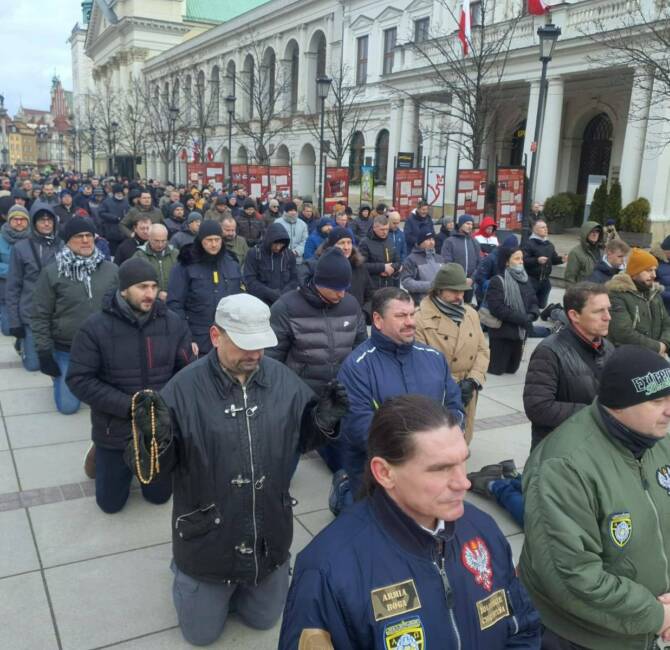Poland/Hungary – Poland and Hungary, whose century-old friendship is often presented as the driving force behind the Visegrád Group, or V4, and more generally behind cooperative initiatives in Central and Eastern Europe (such as Visegrád+ and the Three Seas Initiative), have opposite positions on the war in Ukraine.
While Poland is calling for ever more sanctions against Russia, Hungary has shown much reluctance (short of blocking them, however), and is opposed to the idea of any embargo on hydrocarbons transported by pipelines, on which its economy depends, as well as in the nuclear sector.
While Poland is the third- or fourth-largest supplier of arms to Ukraine, and is the country that has delivered the most tanks to its eastern neighbour, as well as the first to have supplied Western-made tanks (German Leopard 2s), and also the first to have announced the delivery of combat aircraft (Soviet-made MiG-29s), Hungary, which likewise provides substantial aid to Ukraine, refuses to make any arms deliveries.
Moreover, it refuses to allow any weapons that are being supplied by other countries to cross its border with Ukraine, whereas Poland is the main logistical hub through which these armaments transit. While Budapest is calling for a negotiated peace and an immediate ceasefire, and Viktor Orbán has spoken of a war between two Slavic countries, the Polish authorities say they are convinced that if Russia wins in Ukraine, it will continue its imperialist push westward, starting with the Baltic States and Poland.
For Mateusz Morawiecki’s government, a Ukrainian victory seems crucial, and the visits of Hungarian Foreign Minister Péter Szijjártó to Moscow (the latest of which took place on April 11, in order to negotiate new gas contracts and a modification of the agreement for the modernisation of Hungary’s Paks nuclear power plant) are described by the Polish media as downright betrayal. In a majority of these media outlets, it is clearly stated: Viktor Orbán and his government are friends of Putin.
On the Hungarian media’s side, the Poles appear to be reckless and guided by both their anti-Russian sentiments and a naive faith in American security guarantees, as well as in an America they supposedly see as committed to a selfless defence of democracy and human rights throughout the world.
In this respect, it was quite interesting to see the results of two opinion polls – one Polish and one Hungarian – on the evolution of the mutual perception of Poles and Hungarians that were presented at a conference organised by the Wacław Felczak Institute for Polish-Hungarian Cooperation in Warsaw on April 18. As shown by the two surveys, although there has indeed been a significant negative evolution, the reciprocal perception remains overwhelmingly positive despite the unfavourable media coverage that has been ongoing for over a year now.
One may wonder what will happen if Russia’s war in Ukraine lasts much longer and the divisions remain, possibly growing even deeper, but for the time being the century-old friendship, which even survived World War II, when the two brotherly nations were on opposite sides, seems to be weathering the political-media storm.
A conference on EU reform from the V4 perspective
The title of the conference was “EU reform, the needs and our possibilities – The Czech, Slovak, Polish, and Hungarian perspectives”. Several think-tanks from the four Visegrád countries were represented, and Hungarian Secretary of State Balázs Orbán’s coordinator for international issues was also present. Balázs Orbán, who himself appeared at the Felczak Institute in Warsaw last November to present Hungary’s strategic thinking to the Poles, is Prime Minister Viktor Orbán’s political director.
On the Polish side, Minister Marek Kuchciński, head of Prime Minister Mateusz Morawiecki’s chancellery, also joined the participants. All this is to say that it was not just a discussion between intellectuals, but a conference aiming at better knowing and understanding the respective positions within the V4, along with a deliberation – in which the Polish and Hungarian governments in particular are interested – on how to continue working together vis-à-vis Brussels in those areas where the Visegrád countries share similar views.
The aforementioned surveys were presented by the Polish CBOS Institute and the Hungarian Századvég Institute, and they had both been conducted between the end of March and the beginning of April. On the Polish side, to the question “In general, is your opinion of Hungary positive or negative?”, 49% of Poles still answer that they have a positive opinion of it against 38% who now have a negative view (the others having no opinion on this subject). This is where we see the greatest deterioration, since in a previous iteration of this same study conducted in 2020, there were 67% positive opinions and only 9% negative.
How Poles view Hungary
Another significant deterioration is that 51% of Poles now perceive Hungary as a fully democratic country, compared with 34% who do not, while the ratio in 2020 was 55 to 10%. On the other hand, the proportion of Poles who think that human rights are fully respected in Hungary has not changed, and remains around 53-54%.
But at the same time, the share of Poles who hold the opposite view has risen from less than 12% to more than 25%. A similar percentage – almost 24% – now believe that Hungary should be excluded from the European Union in light of its alleged violations of EU rules and its lack of European solidarity. This opinion is shared by only 18% of right-wing Polish voters, however, compared with 36% of left-wing voters.
Furthermore, when asked about the deterioration of Polish-Hungarian relations, 58% of Poles believe that these relations have indeed deteriorated, and of these, 67% blame Hungary and only 2% blame Poland. But as in 2020, more than 30% would like to see relations between Poland and Hungary strengthened, while the percentage who would like to see these relations curtailed has risen from 9 to 19%. 53% still believe that the current relationship can be described as one of Polish-Hungarian friendship, while 33% do not.
And finally, 50% of Poles believe that Hungary is now a close ally of Russia (26% are of the opposite opinion), and 67% believe that it only cares about its own interests, while just over 15% do not agree with that view. The perception of Hungarians themselves remains very positive in Poland, with an overwhelming majority of respondents perceiving Viktor Orbán’s countrymen as patriotic, kind, and friendly to foreigners.
How Hungarians view Poland
On the Hungarian side, some negative development is also visible, with 63% of Hungarians maintaining a positive opinion of Poland in March 2023, compared with 86% in June 2019, while the percentage of negative opinions has jumped from 9 to 16%. 58% of Hungarians versus 29% believe that Poles are guided by their historical grievances in their policy towards Russia as well as Germany, but only 33% believe that the Poles are uncritical supporters of American foreign policy, with 43% taking the opposite view.
Interestingly, in the context of the currently diverging views between the two peoples (and not only between the two governments, as confirmed by polls) regarding Russia’s invasion of Ukraine, to the statement “The Poles are driven by their own ambitions for great power and are not interested in the fate of smaller neighbouring nations”, only 22% of Hungarians answered in the affirmative, while almost 50% answered in the negative.
When compared with the other two V4 partners, Poland is now on par with Czechia in terms of the percentage of positive opinions among Hungarians. 56% have a positive opinion of Poland in 2023, compared with 73% in 2019, while Czechia has gone from 50 to 57% positive opinions in those 4 years, with Slovakia showing only a slight improvement, from 35 to 38% positive opinions among Hungarians (while 42-44% have no particular opinion on the issue, with negative opinions towards the other V4 countries remaining at around 15% towards Slovakia and 6-7% towards Poland and Czechia).
And regardless of how the perception of Poland has changed, 47% of those surveyed by the Hungarian polling institute believe that, of the three V4 partners, Hungary has the closest relationship with Poland (13% point to Slovakia and 6% to Czechia), and 81% believe that the cooperation between Poland and Hungary should be further strengthened in EU forums.
All agree on the need for regional cooperation in the face of Brussels, Berlin, and Paris
In any case, as the participants in this conference pointed out against the backdrop of disagreement on the Ukrainian question between the Hungarian delegation and those of the other three Visegrád Group countries, regional cooperation in Central Europe remains essential for curbing the federalist tendencies that are in vogue in Brussels, Berlin, and Paris, and also to act as a counterweight to the Franco-German couple within the EU. As the representative of the very Atlanticist think-tank Centre for Transatlantic Relations of the CEVRO Institute in Prague acknowledged, “Putting an end to the V4 would be tantamount to signing our political death warrant”. And Poland, because of its size, remains a natural and desirable regional leader for Hungary.
The head of the Centre for Geopolitics of the Mathias Corvinus Collegium (MCC) Foundation in Budapest gave the example of the ban on imports of grain and other Ukrainian agricultural products that have been exempted from customs duties since last year throughout the EU. Faced with the issue of its farmers having to compete with cheaper products that do not always meet EU standards, Hungary had already wanted to ban these imports for several months in order to force the European Commission to react and change the import rules, but it was only able to do so when Poland itself decided to block these imports on Saturday, April 15. This brought in its wake not only Hungary, but also Slovakia, Romania, and Bulgaria, thus compelling the Commission to sit down at the negotiating table with the five countries of its eastern flank, which was Warsaw’s stated goal, as expressed by Polish Agriculture Minister Robert Telus when he announced the decision.




